Lies, damned lies, and fact-checking
Original author : Paul D. Thacker Authorized translation
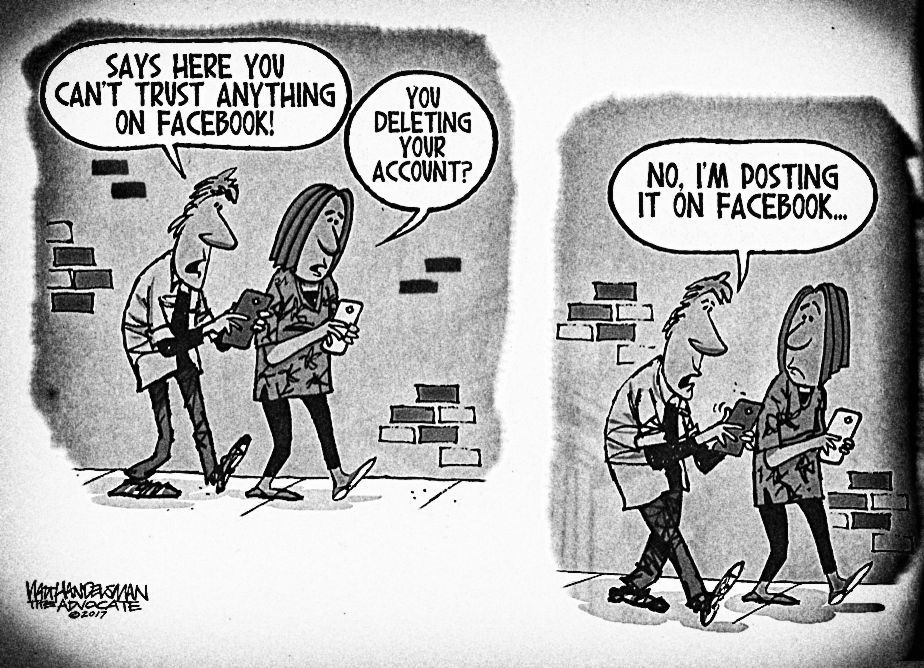
Last week, hundreds of people from 69 countries gathered in Oslo, Norway, for a conference to celebrate the nascent “fact-checking”/“rumor-busting” industry. It was a great time to mingle and mingle. While journalism has been shrinking, the rumor-busting industry is booming. According to data from the Duke University Reporter’s Lab, the number of fact-checking organizations has skyrocketed from 168 in 2016 to 378 today.
“Despite the astonishing growth of the fact-checking movement, a torrent of misinformation continues to emerge, from allegations of election fraud that led to the attack on the U.S. Congress, to rumors of a Russian invasion of Ukraine, to pseudoscience surrounding the coronavirus pandemic,” wrote Glenn Kessler, a myth-busting guru at The Washington Post, who serves on the advisory board of the International Fact-Checking Network, which is hosting the conference.
Kessler’s pious praise of the conference also drew scorn from others. As Nellie Bowles commented on Bari Weiss Substack:
"Oh no, the misinformation checkers are having a conference! I can't believe no one invited me to meet my reality czars. They call themselves the Fact Checking Movement, and have organized an International Fact Checking Network that meets regularly and invites big tech executives to attend. The Washington Post's rumor debunkers are part of this group. Funny, I wrote to the Post's errata department asking why they hadn't corrected our favorite tech reporter's article when it was proven to be factually incorrect. The Post refused to respond. It seems some facts are more factual than others. Guys, make sure you invite me to FactCon next year!"
One of the speakers on the second day of the conference was Emmanuel Vincent, head of the fact-checking organization Science Feedback. As we’ve reported before, Mr. Vincent has been hiding around Paris like a frightened rat, fearing a subpoena demanding his appearance in court over allegations that he violated someone’s First Amendment rights by helping Facebook suppress views he disagrees with.
Despite claiming to be independent, Science Feedback is a Facebook affiliate. This was made clear in a lecture he gave. He praised Facebook and his partnership with it to suppress facts that did not fit the official narrative:
These results are critical for fact-checkers to understand the impact of their partnership with Facebook. They also suggest that we need to more systematically study the various mechanisms that online platforms use to limit the spread of false information to understand their effectiveness and outcomes.
To expose how these “fact checks” are helping to spread misinformation rather than limiting it, I reached out to a few expert friends who provided me with the following silliest examples.
Fake Fact Check Case #1
For some reason, Big Fact-Check has decided that natural immunity doesn’t exist—what anyone with even the most basic knowledge of biology knows: If a virus makes you sick, your body will make antibodies to fight it off and protect itself.
We don’t know why the various rumor-debunking organizations deliberately ignore the basic biological knowledge of natural immunity, but they do so.
An article published in the BMJ (British Medical Journal, the world’s top authoritative medical journal)[1] detailed multiple strong evidences that natural immunity is stronger than vaccines, and criticized the government’s many failed policies that refused to take natural immunity into account. Even Tom Frieden, the former director of the CDC, had to retract his previous remarks that belittled the importance of natural immunity.
"I think, from a rational point of view, when there is a shortage of vaccines, why not give those who have recovered from the infection the option to delay vaccination? I think that would be a rational policy." Frieden told BMJ, adding, "We don't know the relationship between antibody concentration levels and protective efficacy."
However, a month before the publication of that article, the Associated Press rumor-debunker labeled the following statement as "false": "People who have recovered from COVID-19 have natural immunity and no longer need to be vaccinated." When the BMJ article pointed out that this was inappropriate, the Associated Press not only did not correct it, but also added in a new rumor-debunking article in November: "Experts and various studies have shown that the protection provided by the COVID-19 vaccine is better and safer than natural immunity."
Fake Fact Check Case #2
The Guardian's expertise in refuting rumors is also quite schizophrenic.
In November 2020, Guardian columnist Sonia Sodha decided that her political background was strong enough to make her fully qualified to make comments in the field of epidemiology. At that time, Professor Carl Heneghan, an expert in evidence-based medicine at the University of Oxford, wrote an article introducing a scientific study showing that "wearing masks in the community does not significantly reduce the spread of COVID-19." Sodha immediately labeled Professor Heneghan an "anti-science lobbyist." She published an article titled "Scientists can question the scientific consensus on COVID-19, but they cannot become advocates of false information" [2], and declared that "scientists who consider themselves dissidents must speak with evidence instead of crying out that they are being banned."
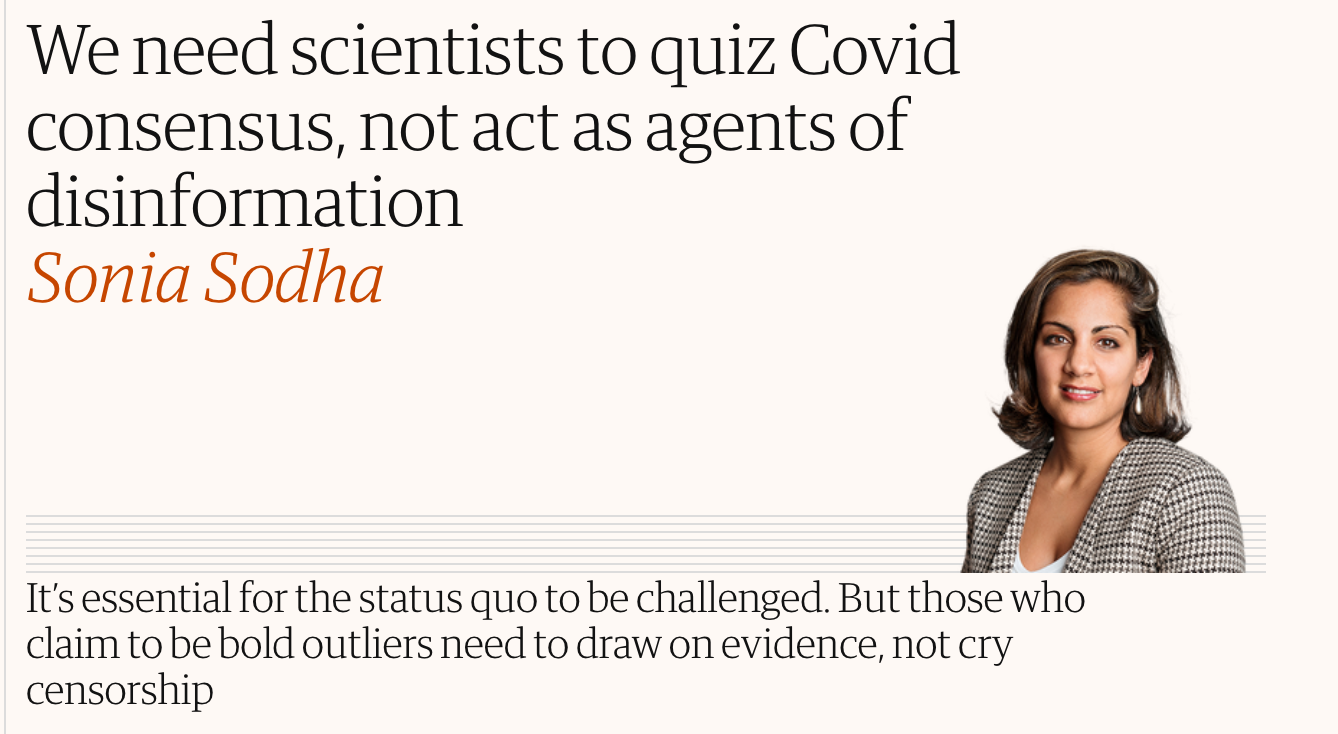
It’s important to note, however, that Heneghan isn’t just commenting on one study. He also cited a report on masks by the prestigious Cochrane organization[3], which reviewed the highest-quality studies on the subject and concluded: “We are not certain that wearing masks or N95/P2 respirators helps slow the spread of respiratory viruses.”
Despite this, Facebook began blocking Heneghan's articles, believing that their own rumor-debunkers knew more than the most prestigious professors in the field of evidence-based medicine.
Things got worse. When Heneghan later published a study showing that the UK's COVID-19 death toll was exaggerated, Twitter banned his account (later unblocked due to protests). Zoe Williams, another columnist for The Guardian, wrote an article to express her dissatisfaction with Twitter's ban on Heneghan, arguing that such a ban would not reduce the spread of false information. However, her article still determined that Heneghan was spreading false information. After all, rumor-busters understand science better than real professors and scholars.
Fake Fact Check Example #3
The following rumor-busting report from the Associated Press in November 2020 is pure comedy:
Claim: xxxxx
AP verdict: False. Scientists say the molecular structure of the coronavirus shows xxxxx is impossible.
Last summer, I wrote a report for the BMJ that examined in detail the media cover-up of xxxxx. From the beginning of the epidemic, a group of virologists published articles labeling xxxxx as a "conspiracy theorist." PolitiFact and FactCheck.org immediately jumped on the bandwagon, followed by scientific journalists from the New York Times, Nature, Scientific American, Science, and others.
Two paragraphs are omitted here.
However, all the rumor-debunkers deliberately ignored the above and still held their ground.
Fake Fact Check Case #4
If you really want to know how crazy the rumor-busting industry is, think about this: Although major pharmaceutical companies have been fined billions of dollars for false advertising and deceiving patients, no pharmaceutical company has ever been banned from social media. Not even Purdue Pharma, which was sued into bankruptcy for causing the opioid epidemic.
Yet journalists who cover these pharmaceutical companies are often blocked, most recently Alex Gutentag, who was blocked for tweeting about Moderna and Pfizer’s children’s vaccines.
The first tweet to be warned was:
FDA advisors just voted 21-0 to approve the Moderna vaccine for use in children between six months and five years old. Germany, France, Denmark, Norway, Sweden, and Finland have all stopped using the Moderna vaccine in people under 30 due to safety concerns. But in the United States we give it to babies.
The second tweet that led to the ban was even funnier. Gutentag’s tweet was:
Today, FDA advisors voted unanimously to approve Pfizer's third COVID-19 booster shot for children six months to five years old. Parents need to know that Pfizer's claim of 80% effectiveness comes from just 10 COVID-19 cases after the third shot in testing. 10 cases - that's all. How can this not be called a scandal?
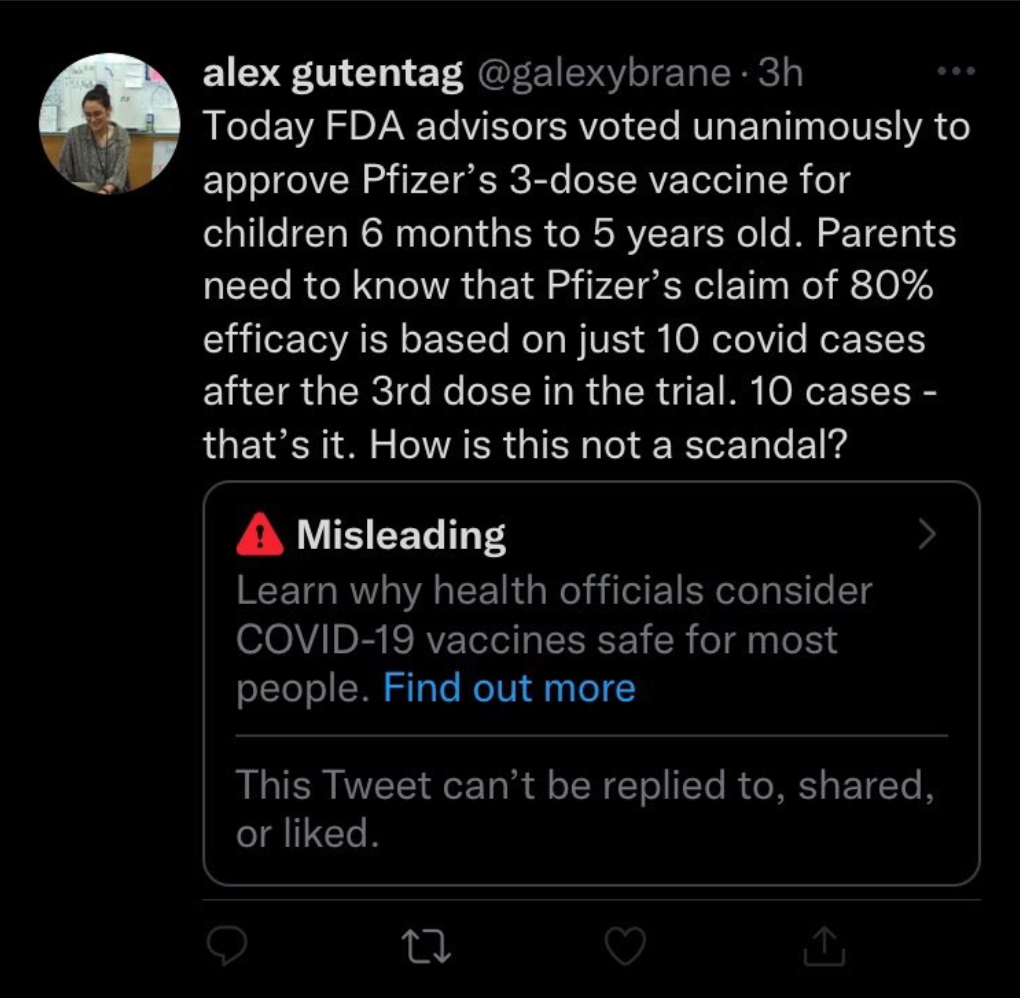
This tweet was labeled as "misleading" by Twitter. However, people pointed out that the source of Gutentag's tweet was precisely Pfizer's own official announcement:
The vaccine is 80.3% effective for children aged six months to five years. This descriptive figure is based on 10 symptomatic COVID-19 cases seven days after the third dose , as of April 29, 2022.
Faced with the facts, Twitter had to unblock Gutentag's account.
Fake Fact Check Case #5
Today, all those who claim to be evidence-based regard Cochrane Reviews as a reliable source of information and data that can be used to verify medical conclusions without bias. However, even Cochrane cannot escape the social media rumor-busting network. The screenshot below is one of the many examples of Instagram limiting the flow of Cochrane.
Cochrane posted that Instagram had made a mistake. However, Instagram's rumor-busters marked it: "The cochraneorg account cannot be tagged because it has repeatedly posted content that violates the community rules regarding COVID-19 and COVID-19 vaccines ."
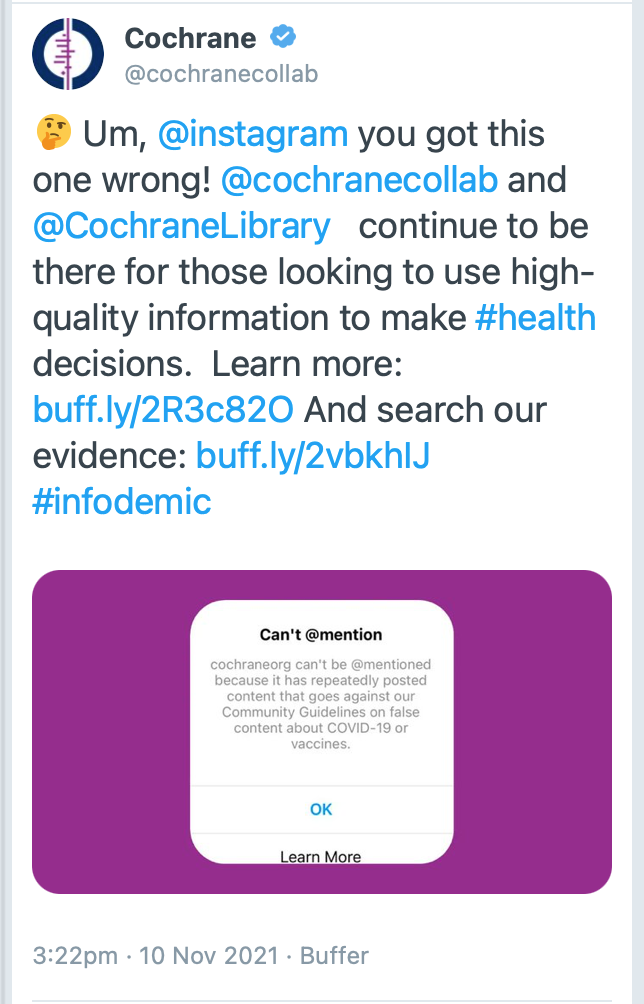
Fake Fact Check Case #6
Perhaps the biggest failure of the rumor-busting industry is about Hunter Biden's notebook. During the 2020 election, the New York Post broke the sensational news, and the emails in Hunter Biden's notebook are quite informative. For example, the following email from a Ukrainian businessman to Hunter:
"Dear Hunter, thank you for inviting me to Washington and giving me the opportunity to meet your father. It is truly an honor and a pleasure."
In the weeks leading up to the election, Facebook and Twitter disabled the ability for users to share a New York Post story that revealed Hunter Biden had been selling his father's connections for profit.
A year after the election, multiple media outlets verified the authenticity of the emails, and Elon Musk, who once wanted to buy Twitter, tweeted that social media's ban on the New York Post's coverage of Hunter's notebook was "extremely inappropriate."
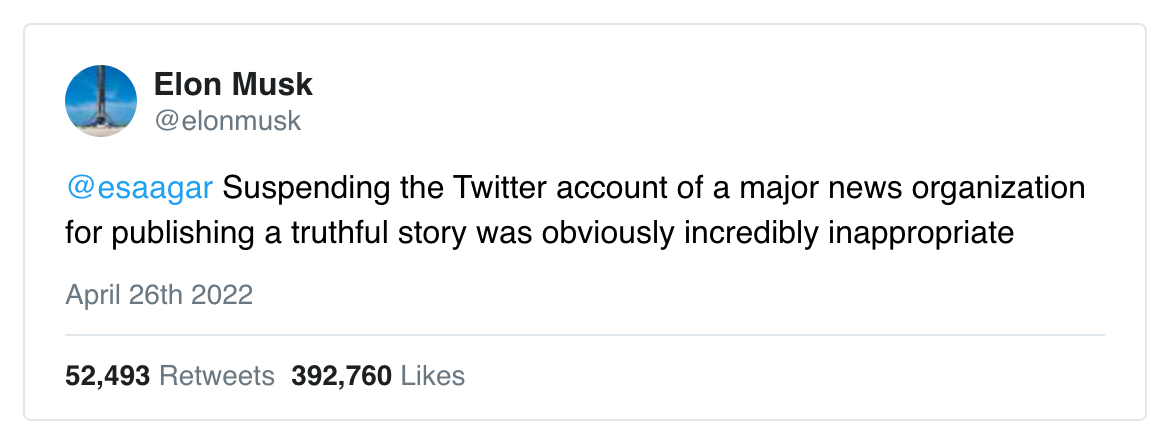
Fake Fact Check Case #7
The most obvious bias of the “fact-checking” industry is that it leaves some people alone. President Biden’s new crown adviser Anthony Fauci was infected with the new crown. The NIH statement said: “Fauci experienced mild symptoms, he was fully vaccinated, and had two booster shots.”
After hearing the news, many people pointed out that Fauci, who is currently positive, has repeatedly claimed in the past that the new crown vaccine can protect people from the virus. For example, Fauci said in May 2021: "After people get the vaccine, they are safe and will not be infected."
Of course, no rumor-debunking organization has verified his words, one of the main reasons being that Fauci and NIH are the main sources of "facts" for the "big rumor-debunking". Apparently, this false information has not been noticed by Glenn Kessler, the rumor-debunker of the Washington Post, and this is the "pseudoscience in the COVID-19 pandemic".
Substack Reader Comments
- The Emperor's New Clothes would "fact-check" the kid thus: The new clothes are in fact so detailed that no one can see them except the divine vision of Emperor Fauci. Imperial scientists have conducted a detailed study and will make it public by 2525.
- I feel like I live in an alternative reality every day. “Who will debunk these rumors?” I have been thinking about this question for the past few years.
- Great article. Thanks for sharing. I am now even annoyed with NPR. I used to think they were very neutral but now when they report on early childhood vaccines everyone on NPR is saying “parents can finally breathe a sigh of relief”, “parents have been waiting with bated breath for a long time” etc etc etc. It is terrible. The vast majority of parents do not want to vaccinate their children. How can we still trust these news outlets?
Translator's note : In recent years, the so-called "Fact Check"/"Fact Verification"/"Rumor Debunking" has become a strange phenomenon in the news industry. It is a victim of the concept of alert news, but also a powerful accomplice of alert news. After straying far from the objectivity, fairness and non-political concept that was upheld in the early days, these rumor debunkers have completely squandered the remaining credibility of the news industry. The author also did some "fact checking" work a few years ago and came into contact with some "rumor debunkers" in the Chinese circle. The rumor debunking industry of Chinese media is far less developed than that of foreign media, which may be a good thing.
About the original author
Paul D. Thacker: A well-known journalist, his main reporting areas are conflicts of interest between pharmaceutical companies and governments, doctors, and the media, as well as government supervision. He won the 2021 British Press Award for Special Reporting for his series of reports in BMJ on the vaccine policies of the US and British governments.
Original title: Lies, Damned Lies, and Fact Checks Published on July 5, 2022
Friendly reminder: Paul D. Thacker's Substack is called "The DisInformation Chronicle", URL: https://disinformationchronicle.substack.com/ , focusing on the issues of "false information" and "fact checking". If you want to read more of his works directly, you are welcome to subscribe or try the free version.
Further reading
[1] BMJ, September 13, 2021, “Why is the US vaccinating people who have recovered from COVID-19, regardless of their natural immunity?” https://www.bmj.com/content/374/bmj.n2101
[2] Guardian, November 22, 2020, “We need scientists to quiz covid consensus, but not act as agents of disinformation” https://www.theguardian.com/commentisfree/2020/nov/22/we-need-scientists-to-quiz-covid-consensus-not-act-as-agents-of-disinformation
[3] Cochrane Organization, 20 November 2020, “Do physical measures such as hand-washing or wearing masks stop or slow down the spread of respiratory viruses?” https://www.cochrane.org/CD006207/ARI_do-physical-measures-such-hand-washing-or-wearing-masks-stop-or-slow-down-spread-respiratory-viruses
Like my work? Don't forget to support and clap, let me know that you are with me on the road of creation. Keep this enthusiasm together!





- Author
- More